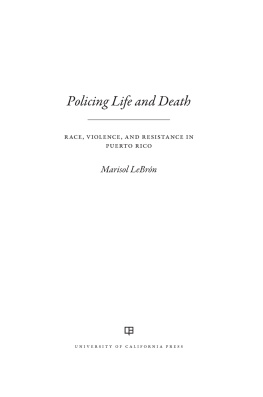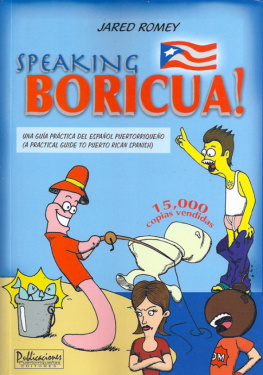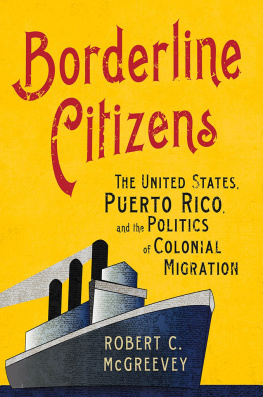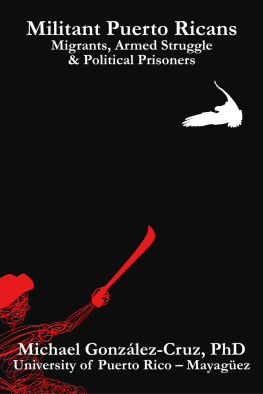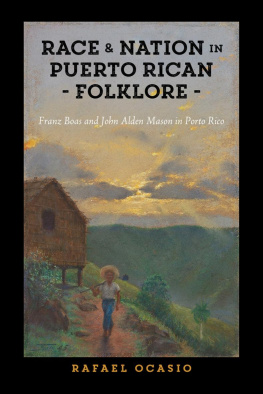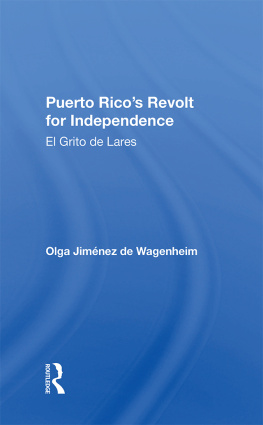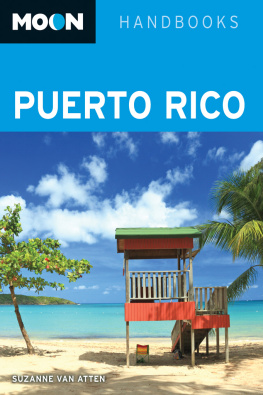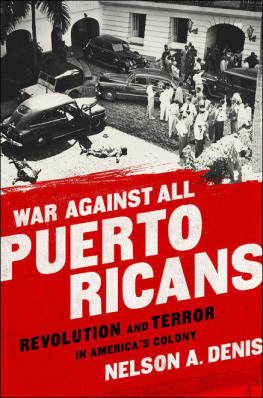Policing Life and Death
Policing Life and Death

RACE , VIOLENCE , AND RESISTANCE IN PUERTO RICO
Marisol LeBrn

UNIVERSITY OF CALIFORNIA PRESS
University of California Press, one of the most distinguished university presses in the United States, enriches lives around the world by advancing scholarship in the humanities, social sciences, and natural sciences. Its activities are supported by the UC Press Foundation and by philanthropic contributions from individuals and institutions. For more information, visit www.ucpress.edu.
University of California Press
Oakland, California
2019 by Marisol LeBrn
Library of Congress Cataloging-in-Publication Data
Names: LeBrn, Marisol, author.
Title: Policing life and death : race, violence, and resistance in Puerto Rico / Marisol LeBrn.
Description: Oakland, California : University of California Press, [2019] | Includes bibliographical references and index. |
Identifiers: LCCN 2018040129 (print) | LCCN 2018044143 (ebook) | ISBN 9780520971677 (ebook) | ISBN 9780520300163 (cloth : alk. paper) | ISBN 9780520300170 (pbk. : alk. paper)
Subjects: LCSH : Discrimination in law enforcementPuerto RicoHistory20th century. | Discrimination in criminal justice administrationPuerto RicoHistory20th century. | Police-community relationsPuerto RicoHistory20th century.
Classification: LCC HV 8174. A 3 (ebook) | LCC HV 8174. A 3 L 43 2019 (print) | DDC 363.2/3097295dc23
LC record available at https://lccn.loc.gov/2018040129
Manufactured in the United States of America
28 27 26 25 24 23 22 21 20 19
10 9 8 7 6 5 4 3 2 1
For my motherthis would not have been possible without you.
Contents
Tables
Acknowledgments
I have been fortunate to have many brilliant and thoughtful accomplices as I worked on this book. Researching and writing this book has been a truly collaborative process, which grew from desires to imagine and work collectively toward a more just world. I am grateful to everyone who pushed me to articulate the stakes of this project and think about it as part of a larger anticolonial and abolitionist intellectual project.
This project would not have been possible without everyone in Puerto Rico who shared their thoughts and struggles with me for nearly a decade. Thank you to Giovanni Roberto, Xiomara Caro, Waldemiro Vlez Soto, Lourdes C. Santiago Negrn, Pedro Lugo Vzquez, Abner Y. Dennis Zayas, Roberto Thomas, Alana Feldman Soler, and Zinnia Alejandro for sharing your stories with me. I am constantly inspired as I continue to follow the important work you all are doing to rethink and transform what it means to really live in Puerto Rico. Maritza Stanchich has been a tremendous source of support, and I always look forward to our conversations as we walk around Old San Juan when Im in town. Gary Gutirrez, Jos Ral Cepeda, Judith Berkan, Osvaldo Burgos, Fernando Pic, Dora Nevares-Muiz, and Ileana Coln Carlo all provided me with invaluable information and insights into the history of mano dura contra el crimen, the Rossell administration, and contemporary human rights violations in Puerto Rico. Thank you also to the staff at the Coleccin Puertorriquea at the University of Puerto RicoRio Piedras, the Biblioteca Legislativa Toms Bonilla Feliciano, Comisin de Derechos Civiles, and Archivo de la Fundacin Sila M. Caldern for helping me locate important documents and materials.
This project began as a doctoral dissertation in American studies at New York University and continues to be nurtured by the mentors, colleagues, and friends I met there. Arlene Dvila, I am eternally grateful for your rigor, kindness, engagement, and support. I cant even begin to express how important your mentorship has been to me. Your intellectual commitments and contributions are a constant source of inspiration. Lisa Duggan, Nikhil Singh, and Cristina Beltrn, thank you for encouraging my scholarship both in and out of the classroom. I was fortunate to go through graduate school with a cohort of brilliant scholars of color. Emily Hue, Eva Hageman, Carmen Phillips, Liza Kenuenueokalani Williams, and Marlon Burgess, I cant think of better people to have gone through this process with. Special appreciation to Leticia Alvarado, Ariana Ochoa Camacho, Johanna Londoo Roy Prez, Karen Jaime, Sandra Ruiz, and Albert Sergio Laguna for all of the Team Exito love and support; Im lucky to have you all as interlocutors. Conversations about empire, war, and policing with Stuart Schrader have animated my thinking since our seminar days together. Elliott Hunter Powell has helped me to think through questions of music, identity, and social resistance in ways that have deeply influenced my work. Justin Leroy, Christy Thornton, Jan Padios, Zach Schwartz-Weinstein, Rana Jaleel Elizabeth Mesok, Zenia Kish, Emma Kreyche, A.J. Bauer, Manijeh Moradian, Claudia Garriga-Lpez, James Rodrguez, Jessica N. Pabn, Miles Grier, Andy Cornell, and Emmy Williamson all made my time at NYU infinitely better and continue to be amazing friends and colleagues.
Gina Prez has been a mentor to me since I was an undergraduate at Oberlin College first dipping my toes into Latinx studies and American studies. Her work was a revelation to me when I first encountered it and was in many ways what made me want to go on and become an academic. I always wrote with Gina in mind, so I was thrilled when I found out she was one of the reviewers for this book. Im appreciative of her analysis and suggestions, which have made this work stronger. Laura Briggs and Carlos Alamo-Pastrana also read this book for the University of California Press and offered critical feedback and guidance that helped me clarify and strengthen my central claims and interventions. The comments they both provided pushed me to clarify and strengthen my claims, and this book is much better as a result. Yarimar Bonilla also read a draft of this book and offered valuable feedback during the revision process. While I was a Postdoctoral Associate in Latina/o Studies in the Global South at Duke University in 2016, I invited Zaire Dinzey-Flores, Dan Berger, Sally Deutsch, and Wahneema Lubiano to read an earlier version of this book during a manuscript workshop. They spent hours carefully engaging with my work, pushing my thinking further, and demonstrating what radical mentorship and collegiality look like. Jordan T. Camp, Christina Heatherton, Chris Agee, and Themis Chronopoulos all read and commented on earlier versions of the first chapter and helped me think through how Puerto Rico fits into larger regimes of urban policing. Ive also presented pieces of this project at a number of venues and am grateful to the countless folks who engaged with the work during invited talks and conference presentations.
The writing process can be incredibly isolating and daunting, especially when academia tends to encourage competition over collaboration. Im grateful to all of the people who provided me with love, friendship, and camaraderie as I worked on this project and reminded me that we can (and should) do academia differently. Ruth Wilson Gilmore has been a staunch advocate of this project since its earliest days, and I am grateful for her constant reminders to always reach for abolitionist horizons in our work and everyday lives. I am indebted to Deborah R. Vargas, Erica Edwards, Kirstie Dorr, Sara Kaplan, and Marisol Negrn for their support, not just of this project but also of me as a scholar and as a person. I cant think of anyone else Id rather be building community and familia with. Nick Mitchell, you are a constant source of joy, and our text chains about everything from antiracist feminist politics to memes are often the highlight of my day. In just the two short years I was at Duke, Jecca Namakkal, Eli Meyerhoff, Elizabeth Ault, Yuridia Ramrez Rentera, Felicia Arriaga, and Danielle Purifoy all helped to make sure that Durham will always feel like a second home. Mark R. Villegas made my time in central Pennsylvania much more manageable with writing dates, trips to seek out good food, and lots of cat videos. Emily Hue, Josen Masangkay Diaz, Davorn Sisavath, and Ashvin Kini have been a source of friendship, support, and accountability. I cant wait to start the next book if it means planning another writing retreat with you all.
Next page
